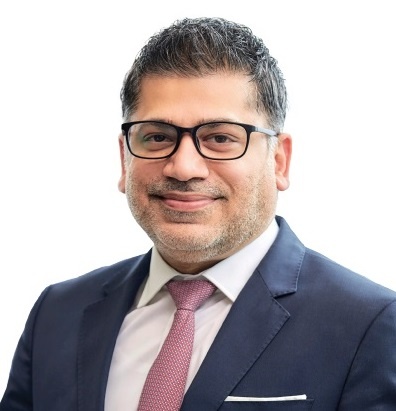AstraZeneca: three healthcare priorities in the new normal
 |
| Nitin Kapoor-Chairman and general director AstraZeneca Vietnam |
At AstraZeneca, our scientists, lab researchers, medical, regulatory and corporate affairs teams, amongst others, have worked tirelessly to see this day. We told ourselves that this is probably the only chance in our lifetime to play such an important role in fighting a pandemic of this scale. It was our duty to offer our best to protect the people.
We worked closely with the Vietnamese government, the Ministry of Health, VNVC, and other partners to deliver and support the bilateral donations of more than 70 million doses of AstraZeneca’s COVID-19 vaccine. Our motivation was to ensure that Vietnam would be one of the first countries in Asia to have access to vaccines to save lives. Vietnam now possesses one of the highest vaccination rates in the world, and we cannot be prouder of what we have accomplished together.
But as a healthcare company, our responsibility does not stop there. While the hardest part of the pandemic is hopefully behind us, we have new priorities in this new normal to ensure everyone is cared for.
Firstly, while vaccines are effective and have provided sufficient protection for most people, there is a 2-3 per cent subset of our population that remains at high risk of severe COVID-19 because of their underlying conditions, such as being immunocompromised, or because they cannot take a vaccine. This vulnerable group needs an extra layer of defence to be able to return to their families and normal lives like healthy individuals. Innovative solutions have been made available. We now need to streamline their pathways to reach the patients in need.
Secondly, we must continue fighting non-communicable diseases (NCDs) – considered a ‘pandemic of silent killers’ such as cancers, heart and respiratory diseases, and diabetes, to name just a few. They did not get the same spotlight as COVID-19 but are responsible for more deaths than all other causes combined, equivalent to over 70 per cent of the medical burden.
Because of social distancing, lockdowns, and an inevitable focus on COVID-19 hospitalisations during the pandemic, a lot of NCD patients have not been able to access the examinations or treatments they need. According to a survey from the World Health Organization, 77.5 per cent of cancer patients globally have faced interruptions or delays to their treatment programme in the last two years, putting their health at risk.
To alleviate this problem, we need to urgently tackle the backlog of NCD care. At the same time, it is important to increase disease awareness programmes to promote NCD prevention, early diagnosis, and treatment, to reduce the burden on both the health system and patients. AstraZeneca will continue to advance our signature healthcare access such as the Healthy Lung and Young Health programmes, and CaReMe, in collaboration with various partners, to contribute to this end.
Lastly, it is imperative that we holistically strengthen the health system so that it is better prepared for future crises. The devastating impacts of the pandemic have highlighted many gaps in our health systems that need addressing, to stop this catastrophe from repeating.
The last two years have confirmed the importance of the grassroots healthcare network – your neighbourhood doctors and nurses at the ward, and district levels who cover everything from primary healthcare, to vaccination, testing, contact tracing, and quarantine management, amongst many other duties. The strength of grassroots healthcare can determine the strength of the health system, but oftentimes health staff at that level face shortages of personnel, equipment, and capabilities.
From the research generated through the Partnership for Health System Sustainability & Resilience, between the Health Strategy & Policy Institute and AstraZeneca Vietnam, grassroots healthcare strengthening is one of our practical recommendations to comprehensively build up the sustainability and resilience of our health system. In the next phase of the programme, we will deepen our research and expand collaboration with additional partners to bring some of these policy proposals to life and get us ready for the next pandemic. Achieving these major goals takes joint effort across and outside the healthcare industry. We hope to receive your support on this journey so that we exit this pandemic truly stronger together. AstraZeneca remains committed to harnessing the power of science to make health happen for our people, society and the planet.
What the stars mean:
★ Poor ★ ★ Promising ★★★ Good ★★★★ Very good ★★★★★ Exceptional
Themes: Healthcare Platform
- PM outlines new tasks for healthcare sector
- Opella and Long Chau join forces to enhance digestive and bone health
- Hanoi intensifies airport monitoring amid Nipah disease risks
- Cosmetics rules set for overhaul under draft decree
- Policy obstacles being addressed in drug licensing and renewal
Related Contents
Latest News
More News
- PM outlines new tasks for healthcare sector (February 25, 2026 | 16:00)
- Masan Consumer names new deputy CEO to drive foods and beverages growth (February 23, 2026 | 20:52)
- Myriad risks ahead, but ones Vietnam can confront (February 20, 2026 | 15:02)
- Vietnam making the leap into AI and semiconductors (February 20, 2026 | 09:37)
- Funding must be activated for semiconductor success (February 20, 2026 | 09:20)
- Resilience as new benchmark for smarter infrastructure (February 19, 2026 | 20:35)
- A golden time to shine within ASEAN (February 19, 2026 | 20:22)
- Vietnam’s pivotal year for advancing sustainability (February 19, 2026 | 08:44)
- Strengthening the core role of industry and trade (February 19, 2026 | 08:35)
- Future orientations for healthcare improvements (February 19, 2026 | 08:29)

 Tag:
Tag:




















 Mobile Version
Mobile Version